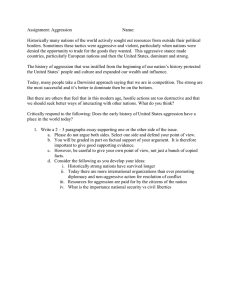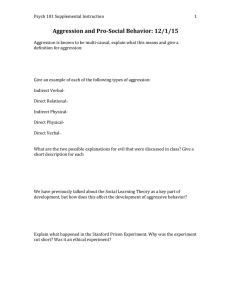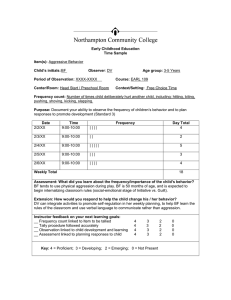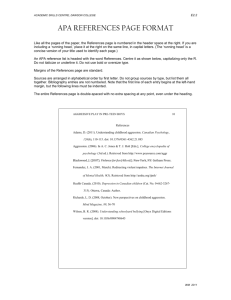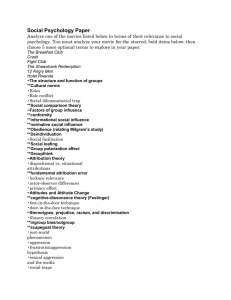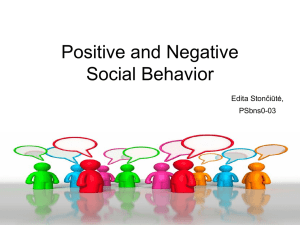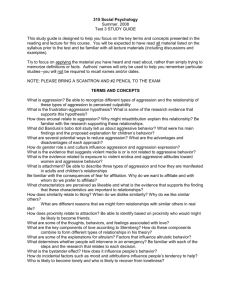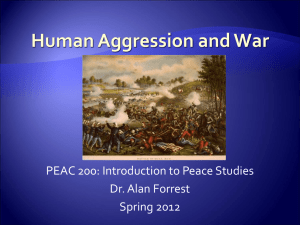Chapter 10 Aggression and Antisocial Behavior Aggressive instincts can
advertisement
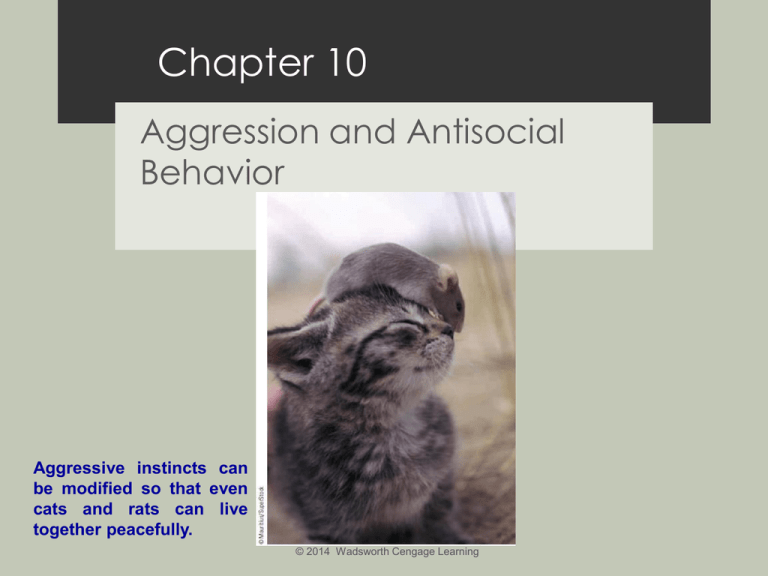
Chapter 10 Aggression and Antisocial Behavior Aggressive instincts can be modified so that even cats and rats can live together peacefully. © 2014 Wadsworth Cengage Learning Chapter Topics Defining Aggression and Antisocial Behavior Why do People Behave Aggressively? Inner Causes of Aggression Interpersonal Causes of Aggression External Causes of Aggression Self and Culture Other Antisocial Behavior Debate: Rwanda and Its Fallout Consider the case of the Rwandan genocide in the 1990s Who was to blame for the genocide? Why? Are people essentially violent or peace-seeking? Offer examples from Rwanda to support your position Defining Aggression and Antisocial Behavior How do social psychologists define aggression differently than most lay people? Aggression – any behavior intended to harm another person who does not want to be harmed. Antisocial behavior – behavior that damages interpersonal relationships or is culturally undesirable. What is displaced aggression? What’s the difference between direct and indirect forms of aggression? What’s the difference between proactive and reactive aggression? How do psychologists define violence? Violence – aggression that has its goal extreme physical harm, such as injury or death. Is the World More or Less Violent Now Than in the Past? If modern weapons kill more people than ancient ones, how are we less violent now than in the past? Overall time the planet is actually becoming more peaceful place to live. How have human beliefs (e.g., the Age of Reason, antislavery, etc.) changed the incidence of violence in the world? How has culture suppressed violence over time? Is Aggression Innate or Learned? How have different forms of government tried to “solve” aggression? Why have they not succeeded in getting rid of aggression? Instinct Theories of Aggression How can aggression be seen as an evolutionary trait? What purpose would it serve in propagating the species? Freud proposed that human motivational forces are based on instinct Sex – life giving instinct – Eros Aggression – death instinct – Thanatos Learning Theories of Aggression How can aggression be seen as a learned trait? How does modeling increase aggression? How does Bandura’s Bobo doll study show the power of modeling aggression? Nature and Nurture How can cultural socialization and learning increase or decrease innate aggressive impulses and aggressive behaviors? How does football illustrate learned behaviors with regards to aggression? How are both learning and instinct relevant? Do we learn aggression? Are we innately peaceful? Inner Causes of Aggression What is frustration-aggression hypothesis? How can this hypothesis explain aggression? Consider a time when you acted aggressively Was frustration a factor? What was the precipitating event? Inner Causes of Aggression (cont’d.) What affect do negative moods have on aggression? Why do unpleasant moods increase aggression? Why do angry people become aggressive? What circumstances would discourage them from becoming aggressive? How can excitation transfer increase aggression? Hostile Cognitive Biases Hostile attribution bias: perceive ambiguous actions by others as aggressive Hostile perception bias: perceive social interactions as being aggressive Hostile expectation bias: assume people will react to potential conflicts with aggression Hostile Cognitive Biases (cont’d.) Aggressive people have inner biases that make them Expect others to react aggressively View ambiguous acts as aggressive Assume others act purposefully when they hurt or offend them Age and Aggression How are toddlers more aggressive than any other age? Why aren’t they perpetrators of violent crimes, if they are so aggressive? Which age group is most violent? Gender and Aggression How do men and women deal with stress differently? Examples: fight or flight syndrome; tend and befriend syndrome What is relational aggression? Which gender is more likely to engage in relational aggression? How is bullying different from other forms of aggression? Selfishness and Influence How can aggression be a means to resolve social disputes? How can aggression be a form of social influence? When do people resort to aggression to get what they want? The Social Side of Sex: Sexual Aggression People use aggression and force to get sex from others Sexual coercion is often defined broadly Consequences for victim are dependent on definition of rape Profile of sexually coercive men differs from traditional stereotypes Domestic and Relationship Violence What is domestic violence? Surgeon General declared domestic violence the number one health risk in U.S. Who is most at risk for domestic violence? What factors contribute to domestic violence? External Causes of Aggression What is the weapons effect? How does the media influence aggression? What happens to aggression levels when men watch videos of rape? What unpleasant environmental situations increase aggression? What effect will global warming likely have on aggression? External Causes of Aggression (cont’d.) What chemicals or substances are associated with higher aggression, and how do they operate? Examples: testosterone, serotonin, alcohol What other drugs and chemicals are linked with aggression? Which chemicals have causal links with aggression? Which have significant correlations? Food for Thought Is there a link between diet and violence? Nutrition is linked to aggression and violence Junk food can increase violence Vitamin supplements reduces antisocial behavior How could legislators use this information to reduce violence in the United States? Self and Culture What does the Malay tradition of running amok reveal about the influence of culture on aggression? How does poor self-control and wounded pride affect aggression? Why is narcissism related to aggression? What role does provocation play in aggression? Culture of Honor What is a “culture of honor?” How does the culture of honor in the southern United States influence levels of violence? How is risk-taking linked to ideas of honor? What causes the increased violence in cultures of honor? What role do culture of honor values play in terrorism? Other Antisocial Behavior Lying In what situations do most people lie? How can you detect liars? Taboo words Who uses taboo words? Why do people use taboo words? Other Antisocial Behavior (cont’d.) Cheating Who cheats? What are some ways to reduce cheating? Stealing Under what circumstances are people most likely to steal? Other Antisocial Behavior (cont’d.) Types of norms Injunctive norms: specify what most approve or disapprove of Descriptive norms: specify what most people do Littering Which type of norm is most effective at reducing littering? What is Broken Windows Theory? How does it relate to littering? What Makes Us Human? Human culture has created unique tools for aggression What tools have humans created for aggression? What categories of aggression are unique to humans? Human culture attempts to restrain aggression Which cultural restraints on aggression work best? Discussion: Antisocial Behavior What types of antisocial behaviors are most prevalent? Which ones are most harmful? Why? Think about a time when you engaged in an antisocial behavior (lying, stealing, cheating, violence, etc.). What do you believe was the cause of that behavior? Conclusion Humans engage in antisocial behaviors, including aggression Aggression has many causes and influences Antisocial behaviors, including aggression, are often a result of several personal and environmental factors
